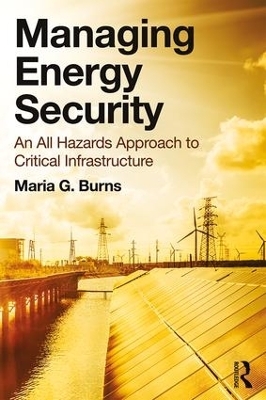
Managing Energy Security
Routledge (Verlag)
978-1-4987-7295-2 (ISBN)
This interdisciplinary book is written for government and industry professionals who need a comprehensive, accessible guide to modern energy security.
Introducing the ten predominant energy types, both renewable and non-renewable, the book illustrates the modern energy landscape from a geopolitical, commercial, economic and technological perspective. Energy is presented as the powerhouse of global economic activities. To ensure the uninterrupted supply of energy, nations, industries and consumers need to have options. Efficient energy security planning ensures that when a primary energy source is depleted, compromised or interrupted, an alternative energy source must be readily available. For this reason, the foundations of energy security are built upon the five pillars of Sustainability, Independence, Efficiency, Affordability and Accessibility. The numerous case studies presented in this book demonstrate that energy security may be compromised in the absence of one out of these five ingredients. The book also entertains the Triple-E notion of Energy Efficiency, Environmental integrity and Economies of scale, used by governments and corporations for energy optimization. One of the key strengths of the book is its ability effectively to cover various scientific disciplines, and several energy types, while remaining comprehensible.
This book will be of much interest to security or logistics professionals, economists and engineers, as well as policymakers.
Maria G. Burns is a National Academies scholar. She serves as the Director for the Logistics and Transportation Program, University of Houston, and as Principle Investigator in the DHS Center of Excellence for Borders, Trade and Immigration Research, led by the University of Houston. She is the author of Port Management and Operations (CRC Press, 2014) and Logistics and Transportation Security (CRC Press, 2015).
Chapter 1: Energy as a Critical Infrastructure Sector, Chapter 2: Major Security and Safety Threat Types, Chapter 3: Global Energy: A Geopolitical and Economic Landscape, Chapter 4: Oil & Gas Security, Chapter 5: Coal Energy Security (Fossil Fuels, Non Renewable), Chapter 6: Nuclear Energy Security: (Non-renewable) Uranium, Plutonium, Thorium, Chapter 7: Wind Power Security, Chapter 8: Hydroelectricity & Ocean Energy Security, Chapter 9: Solar and Geothermal Energy, Chapter 10: Biofuel & Biomass Security, Chapter 11: Cyber Security in the era of Big Data, Chapter 12: Energy Security Forecasting
| Erscheinungsdatum | 15.04.2019 |
|---|---|
| Zusatzinfo | 48 Tables, black and white; 92 Line drawings, black and white; 20 Halftones, black and white; 112 Illustrations, black and white |
| Verlagsort | New York |
| Sprache | englisch |
| Maße | 156 x 234 mm |
| Gewicht | 758 g |
| Themenwelt | Naturwissenschaften ► Biologie ► Ökologie / Naturschutz |
| Naturwissenschaften ► Physik / Astronomie | |
| Sozialwissenschaften ► Politik / Verwaltung ► Europäische / Internationale Politik | |
| Technik ► Elektrotechnik / Energietechnik | |
| ISBN-10 | 1-4987-7295-1 / 1498772951 |
| ISBN-13 | 978-1-4987-7295-2 / 9781498772952 |
| Zustand | Neuware |
| Haben Sie eine Frage zum Produkt? |
aus dem Bereich


